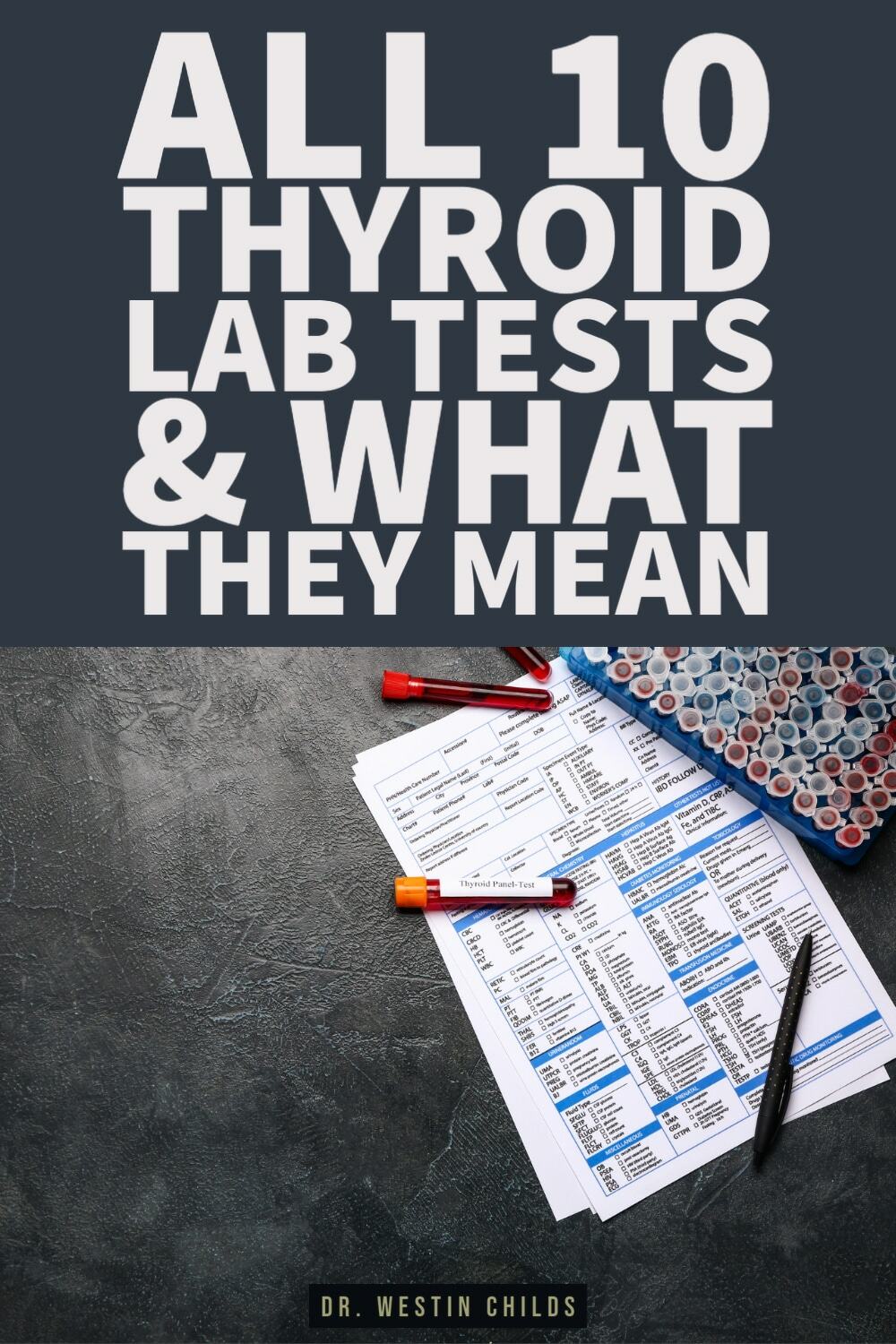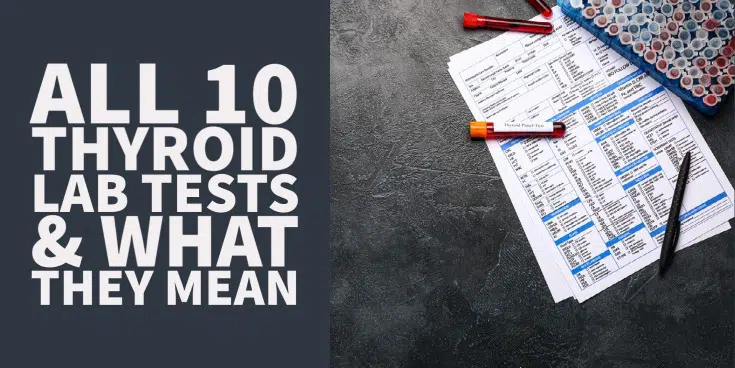Are you suffering from the symptoms of thyroid disease but you have “normal” thyroid lab tests?
Maybe you are already taking thyroid medication but some of your thyroid lab tests seem “off”.
Either way, this is the guide for you.
This post will walk you through everything you need to know about thyroid lab testing including the complete list of thyroid lab tests, what they mean, how to interpret them, and a frequently asked questions guide to top it off.
Let’s jump in:
The Importance of Thyroid Lab Testing
Lab testing, in general, is incredibly useful because it helps us understand what is happening on the inside of our bodies.
While lab testing is helpful for increasing our understanding it’s often an insufficient test on its own.
What do I mean?
Well anytime we draw blood from you we are only taking a sample of what is happening in your entire body and we are attempting to use that information to draw a conclusion.
But it doesn’t always make sense to do this unless we have a thorough understanding of what each lab test means.
For instance:
Some measurements that we can draw from the blood last only minutes in the bloodstream and if we don’t draw the blood at the right time then we may miss the opportunity to diagnose or evaluate certain events.
In addition, some hormones tend to peak at certain times of the day, so if we draw labs at the wrong time then we may not have a clear picture.

Other hormones tend to be completely inactive in the bloodstream and become active once inside the cells – but we can’t check the cells like we can the bloodstream.
It’s also important to remember that your bloodstream is simply a highway and a transportation method used to bring nutrients, hormones, and proteins to other parts of the body.
When we sample the blood we can only determine what is happening in the transport system and then draw a conclusion about what is probably happening at the cellular level.
Most of the hormones that we sample in the blood have zero activity in the bloodstream, instead, all of their activity is at the cellular level.
Why is this important?
Because we can’t actually test what is happening at the cellular level without taking a tissue biopsy!
And think about how difficult it would be to apply this logic to ALL tissues in your body for something as complex as thyroid function.
It’s simply not feasible to take a biopsy sample of every single tissue in your body to determine if your thyroid is actually working.
Instead, we take a sample from your blood and we try to extrapolate what is happening at the distant tissues BASED on the results.
Obviously, you can see that this concept has some inherent flaws built in, which is why you can’t rely 100% on blood testing (1).
In order to get a complete picture, you also need to consider other factors such as clinical symptoms and imaging studies (thyroid imaging).
Bottom Line: The best way to evaluate thyroid function is to combine thyroid blood tests with a complete history, physical exam and potentially imaging studies such as an ultrasound. Using all of these will help give you a clear picture of what is going on in your body.
DOWNLOAD FREE RESOURCES
Foods to Avoid if you Have Thyroid Problems:
I’ve found that these 10 foods cause the most problems for thyroid patients. Learn which foods you should avoid if you have thyroid disease of any type.
The Complete List of Thyroid Lab tests:
The list includes optimal ranges, normal ranges, and the complete list of tests you need to diagnose and manage thyroid disease correctly!
What do These Labs Tell Us?
So now that we understand that thyroid lab tests are not perfect we can begin to talk about why they may be helpful.
Thyroid lab tests are still a critical part of thyroid evaluation because they can give us important information on the FUNCTION of the thyroid gland.
And this is important for several reasons:
The first is that you should consider the function of all tissues in your body on a spectrum instead of like a light switch.
In the spectrum analogy, you can think about thyroid gland working as a percentage of some total (2).
So your thyroid gland may be working at 70% of normal or some other value.
This should be compared to the light switch analogy in which some people tend to think about the thyroid either working or not.
This isn’t a fair analogy because the thyroid does not function in this way.
In fact, if your thyroid was truly “off” then you would probably be dead because thyroid hormone is essential for life (3).
Second is that is more than just one thing that can go wrong with your thyroid gland.
Complete thyroid lab testing can shed light on other important indicators of thyroid function (which we will discuss below).
So the real value in ordering thyroid lab tests is in understanding the function of the thyroid gland at various stages in the thyroid hormone life cycle.
These important factors include:
- Thyroid conversion (4) (Reverse T3, free thyroid hormone levels)
- Thyroid gland hormone production (5) (Free and total thyroid concentrations)
- Thyroid hormone cellular sensitivity (6) (SHBG)
- Pituitary function (7) (TSH)
- Immune function (8) (Thyroid antibodies)
Don’t let this information scare you or seem overwhelming.
It may seem that way at first but I’m going to break down each section and make it easy to understand in the information to follow.
The goal here is to understand that thyroid function is more complex than the standard TSH and free T4 testing that you probably have received in the past.
If you fall into this boat then just realize that those tests are certainly helpful but you may need a more expanded thyroid panel in order to get a more complete picture of thyroid function in your body.
With that in mind, let’s jump into the list:
Bottom Line: When evaluating thyroid lab tests you want to check for more than just the TSH and look at other important thyroid functions such as peripheral thyroid conversion, immune function, and thyroid cellular sensitivity.
The Complete List of Thyroid Lab Tests to Ask For
These lab tests represent ALL of the tests that are available for testing and evaluating thyroid function.
These tests are not always necessary, but they should be considered for your first visit to your physician.
They should also be coupled together with a complete physical exam and comprehensive history (your Doctor should do these as well).
When you combine the power of advanced thyroid testing with a history and physical exam you should be able to adequately identify 98% of all thyroid disease states.
Note that this approach will take a significant amount of time (probably 1 hour at a minimum with your physician).
#1. Thyroid Stimulating Hormone (TSH)
The first test worth discussing is the TSH or thyroid stimulating hormone.
If you’ve ever had your thyroid tested before then this is probably the test that your Doctor ordered (9).
The TSH is secreted from a gland in your brain known as the pituitary gland and TSH is responsible for stimulating your thyroid gland to produce thyroid hormones (both T3 and T4).
One confusing aspect about TSH is that it isn’t always intuitive.
When TSH is high it generally means that your thyroid is not producing enough thyroid hormone.
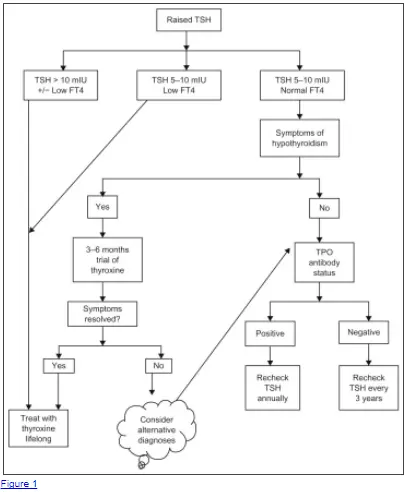
When TSH is low it generally means that your thyroid is producing too much thyroid hormone.
But how can this be?
Why would your thyroid produce less thyroid hormone when TSH is high, especially since its name is thyroid STIMULATING hormone?
This is the confusing part about TSH!
The reason for this inverse relationship between thyroid hormones and TSH is that in most cases of hypothyroidism your thyroid gland is the main problem.
So your body continually increases TSH in an attempt to tell the thyroid gland to produce more thyroid hormone but your body is incapable of doing that due to thyroid gland damage.
So TSH continues to rise while thyroid hormone levels continue to fall.
Make sense?
This relationship between thyroid hormones and thyroid gland function is why TSH is often considered to be the “ultimate” thyroid lab test (10).
In fact, most physicians determine thyroid function based solely on the TSH.
But it does NOT give you information on thyroid status in the peripheral tissues, on thyroid hormone conversion and on thyroid hormone cellular activation.
So while the TSH is definitely a useful test it should be ordered in addition to other thyroid lab tests that we will discuss below.
What is the Normal Range for TSH?
This is an area that is intensely debated even today.
The standard “reference range” on lab testing is usually between 0.5 and 5.5 (but note that this reference range changes based on which lab testing facility you are using):

Most physicians when they evaluate TSH they don’t have an optimal range in mind, instead, they are looking to see if you fit into the “reference range”.
This may not be the best idea because newer studies have shown that people with normal thyroid function tend to have a TSH close to 2.0 (12).
And even other studies have shown that perhaps a more normal TSH is closer to 1.0 (13).
Another important factor to consider is the difference between a normal TSH in a person with a healthy thyroid and a “normal” TSH level in a hypothyroid patient that has been achieved with thyroid hormone replacement therapy.
It’s entirely possible that these conditions are NOT comparable and the very fact that you are taking thyroid hormone replacement therapy may render thyroid hormone serum lab levels inaccurate.
This is an emerging concept but still worth considering.
What does this lab actually tell you?
The TSH provides information on pituitary function and how responsive your thyroid gland is to pituitary function.
The TSH can be manipulated depending on which thyroid medication you are taking and how much.
TSH suppression from T4 thyroid medication doesn’t necessarily mean that you are ‘hyperthyroid’ so this test should be used in conjunction with the others listed here.
TSH suppression from T3 medications may however cause pre-mature bone loss and potentially increase your risk of developing atrial fibrillation. You can learn more about these risks here.
#2. Free T3 (Free Triiodothyronine)
Free T3 may be perhaps the most important measure of thyroid function in the serum.
Free T3 represents the amount of circulating T3 in your blood that is FREE and ACTIVE to do the work of thyroid hormone in the body and at the cellular level.
But why is this important?
Because T3 is the ACTIVE thyroid hormone and it is responsible for all of the benefits that your thyroid produces.
The interesting thing about the free T3 level is that it can be low even when the TSH is relatively normal.
But based on the function of T3 in the body it should carry more weight than the TSH in situations where the TSH is normal but the free T3 is low.
As an example, free T3 levels are closely related to metabolic function in thyroid patients and their ability to lose weight.
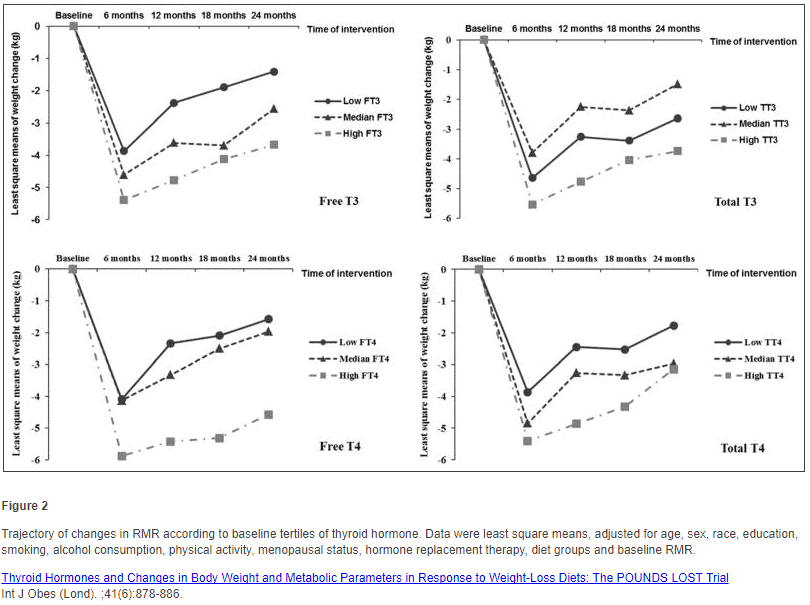
In addition, some studies have shown that free T3 may be a more sensitive marker of illness than other standard lab tests such as TSH.
This has to do with the volatility of free T3 as a representation of cellular thyroid function when compared to the standard reference ranges.
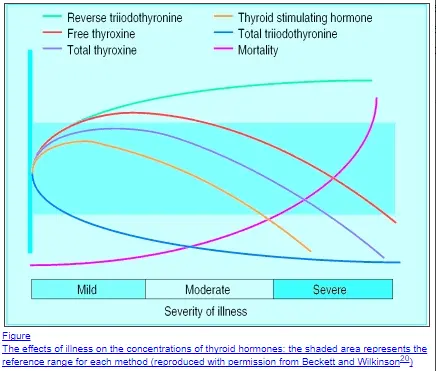
Because of the importance of free T3 it should always be tested when evaluating thyroid function and based on these studies it’s probably a good idea to put more weight on free T3 when compared to the TSH.
What is the Normal Range for Free T3?
The standard reference range for free T3 is usually around 1.7 to 3.7.

Optimal ranges are probably achieved when free T3 levels are in the upper 30-50% or so of that reference range.
Low free T3 despite taking T4 medications such as Levothyroxine may indicate a thyroid conversion issue.
What does this lab actually tell you?
Free T3 gives you an idea of how much potential activity your thyroid gland has in the serum and is perhaps a more sensitive marker of thyroid function when compared to TSH and Free T4.
How do you increase free T3?
Because free T3 is the most important measure of thyroid function in your body it makes sense that you will want to keep your levels as optimal as possible.
You can increase your free T3 in 2 main ways:
Through the use of natural therapies and through the use of specific thyroid medications which contain this hormone.
#3. Free T4 (Free Thyroxine)
The Free T4 is another important lab test especially if you are using T4 only thyroid medications such as Synthroid, levothyroxine or Tirosint.
Free T4, like free T3, gives you an idea of the amount of thyroid hormone that is FREE and ACTIVE in the bloodstream.
The primary difference between T4 and T3 is that T4 is not as biologically active as T3 (16).
T4 must be converted into T3 in order to be activated so your T4 concentration can be thought of as a reservoir for T3 conversion.
This makes the free T4 a valuable marker but probably not as valuable as total T3 and free T3.
When you take T4 only thyroid medications you should notice an increase in free T4 concentrations in the bloodstream (you can use this to track how responsive you are to treatment).
What is the Normal Range for Free T4?
The standard reference range for free T4 is around 0.7 to 1.9.
Like free T3, there are instances where the TSH may be normal but the free T4 may be low.
Because free T4 has potential to become active through thyroid conversion it may be a more sensitive marker of thyroid function than TSH as well.

Free T4 may not be as sensitive when compared to other thyroid medications, however, because it tends to change or drop with supplementation of T3 containing thyroid medications.
The reason for this has to do with suppression of thyroid hormone production from the thyroid gland when using T3 containing medications.
This isn’t necessarily a concerning thing, but worth pointing out if you check your labs after taking this type of thyroid medication.
You can learn more about free T4 reference ranges and what it means for your medication dose here.
What does this lab actually tell you?
Free T4 gives you an idea of the potential activity that your thyroid gland has which should be compared to the free T3 which gives you a direct idea of activity.
As an analogy, Free T4 can be thought of as potential energy while free T3 can be thought of as kinetic energy.
#4. Total T3
Total T3 is a measure of the total amount of T3 in the serum which is bound to proteins and carriers in the serum.
Thyroid hormone (or any hormone) which is bound to a protein is considered to be in a less biologically active state when compared to free hormones.
Total T3 can, therefore, provide a more long term view of serum T3 levels when compared to free T3.
It’s particularly helpful when the patient is using T3 containing medications such as NDT or Cytomel/Liothyronine.
Like free T3, total T3 tracks well with thyroid outcomes such as weight loss and energy production which makes it a valuable thyroid lab test (17).
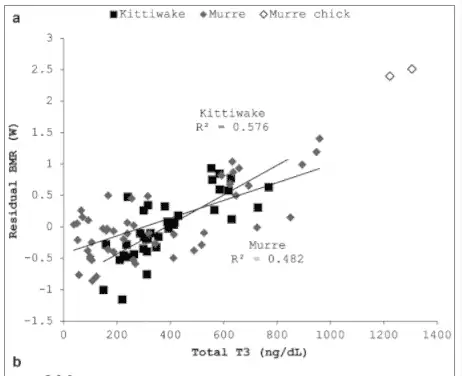
What is the Normal Range for Total T3?
The optimal range for Total T3 is in the upper 50% of the reference range that your lab uses (this is different with each lab).
What does this lab actually tell you?
The total T3 gives you a more long term idea of how much T3 is available in the body but should be differentiated from Free T3 which gives you a more immediate idea of available thyroid hormone.
#5. Reverse T3 (Reverse Triiodothyronine)
Another very important thyroid lab test and one that is often overlooked is Reverse T3.
Reverse T3 is created from a conversion process using T4 as substrate in a similar way that T3 is created.
T4 can either be used by your body to create the ACTIVE thyroid hormone T3 or the INACTIVE thyroid metabolite reverse T3.
You can think of this option as a fork in the road and it’s a decision that your body makes based on the current DEMAND of certain tissues.
So if your body has an immediate demand for more energy and more thyroid hormone then it will opt to create T3 over reverse T3.
But if your body wants to blunt thyroid hormone production and slow down your metabolism then it may opt to create Reverse T3 instead of T3.

Make sense?
This system probably evolved in order to help your body closely regulate how much thyroid hormone it makes and uses.
But like all hormone systems, it can become dysregulated and that’s when we start to see problems.
Certain patients may have excessively high levels of reverse T3 (due to things like calorie restricted dieting, inflammation, gut dysfunction (18) and so on) which may actively block and limit the function of active thyroid hormones.
The main issue with these states is that they often go unnoticed unless the reverse T3 is checked.
The reverse T3 lab test is well known by many physicians, especially those who treat patients in the hospital because it often rises dramatically in acute illness (19).
This rise in acute illness is likely meant to slow down the metabolism of nonvital functions in an attempt to heal the body.
We can use this example and extrapolate it out to patients who have chronic disease in which this same process may occur but at a more sinister and difficult to manage level.
For these reasons, it’s VERY important to assess reverse T3 in addition to other thyroid lab tests!
What is the Normal Range for Reverse T3?
The reverse T3 level is often measured in ng/dL and the reference range varies from 9.0 to 27.0 depending on which lab you use.

The idea with reverse T3 is that you want it to be as low as possible but still be in the reference range.
The reverse T3 will often dramatically rise in periods of extreme stress (both physiologic and physical), illness, due to certain medications, secondary to extreme diets (the example above is after the HCG diet) and any other trauma to the body.
Following the reverse T3 can also be used during thyroid hormone replacement therapy.
What does this lab actually tell you?
Reverse T3 gives you an idea of how much competition there is at the cellular level.
High levels of reverse T3 may indicate an environment in which it is difficult for T3 to get into the cells and turn on genetic function.
#6. Sex Hormone Binding Globulin
SHBG is a protein that is produced from the liver in response to two hormones: Estrogen and Thyroid hormone.
In the event that your estrogen is normal (which is true for most people), SHBG can be used as a proxy to determine if you are absorbing and utilizing thyroid hormone at the level of the liver (20).
Thyroid hormone that is taken by mouth MUST be absorbed and converted in order to be active in the body.
So if you have low SHBG from hypothyroidism and you take thyroid replacement hormones then you SHOULD see a rise in SHBG (again assuming normal estrogen levels).
If you see a rise then you can make the assumption that you are absorbing and utilizing thyroid hormone adequately.
If, on the other hand, you do not see a rise then you may need to re-evaluate the type and dose of thyroid medication that you are taking.
In addition, SHBG may be used as a sensitive marker to help determine how active your thyroid is at baseline if you are NOT taking any medications.
What is the Normal Range for Sex Hormone Binding Globulin?
The normal range for SHBG varies depending on the lab so instead of absolute values you want to make sure it’s around the 50-70% of the reference range (depending on which lab you use).
The reason you don’t want it too high is that SHBG may elevate and start to bind your sex hormones such as testosterone and therefore cause other issues.


Just like SHBG can be used to determine if you are taking sufficient thyroid hormone it can also be used to help determine if your thyroid dose is too high.
If you are taking thyroid medication and your SHBG is elevated this may be an early indicator that your thyroid dose is excessive.
It may also be that your SHBG is elevated due to high estrogen so you will need to order SHBG in addition to estrogens/progesterone.
What does this lab actually tell you?
SHBG can act as a proxy for the cellular activity of thyroid hormone.
It can also act as a proxy to help determine if you are absorbing thyroid medication taken by mouth.
#7. Thyroglobulin Antibodies (TGAb) & Thyroid Peroxidase Antibodies
These two lab tests fall into the category of antibodies which may attack and damage your thyroid gland.
The presence of these antibodies in your bloodstream may indicate that you have an autoimmune thyroiditis disease (though not all cases of elevated antibodies indicate thyroid damage).
Thyroid antibodies are not routinely checked by conventional physicians because it is felt that they do NOT alter management (21).
This is unfortunate considering the value that these antibodies give you as a means to track the progression of thyroid disease.
In addition, knowing that you have antibodies to your thyroid can help you to correctly identify and diagnose your condition.
What is the Normal Range for TGAb?
When it comes to antibodies in the serum, you should consider an elevation (regardless of the degree) to be a problem.
If you have the combination of thyroid symptoms plus thyroid antibodies this is often enough to diagnose autoimmune thyroiditis.

With that in mind, you would ideally want your thyroid antibodies to be as LOW as possible and preferably to be undetectable.
Elevated levels are obviously a problem, but unfortunately, the degree of elevation may not necessarily correlate with your disease state.
In some cases, late-stage Hashimoto’s and autoimmune thyroiditis may result in “burn out” of the thyroid gland due to thyroid damage and a decline in thyroid antibodies.
If the disease state is caught early then tracking and monitoring thyroid antibodies may be helpful to monitor your disease state.
What does this lab actually tell you?
Thyroid antibodies help to identify the CAUSE of your thyroid problems.
Their presence may indicate that your body is attacking your own thyroid gland and causing damage.
This attack can lead to both hyperthyroid and hypothyroid depending on the disease state.
You can learn more about the importance of these tests here.
#8. Thyroid Stimulating Immunoglobulins (TSI)
Thyroid stimulating immunoglobulin is another test that is helpful in diagnosing the condition of Graves’ disease.
This test is not necessary to order on every person, but in cases where you are experiencing the symptoms of hyperthyroidism, it should be seriously considered.
Hyperthyroid symptoms are easily diagnosed when compared to hypothyroid symptoms so this disease state is not missed as often as other thyroid conditions.
It is included here for completeness but just realize that not everyone will need it.
What is the Normal Range for TSI?
Like other antibodies in your serum, you will want these to be as close to zero as possible.
What does this lab actually tell you?
Any elevation may indicate Graves’ disease.
#9. Thyroid Ultrasound
Another way to evaluate the thyroid is the use of imaging studies such as a thyroid ultrasound.
This imaging study is a non-invasive quick and easy way to evaluate the overall size of the thyroid gland and can adequately assess for inflammation or other irregularities in the gland itself (23).
Thyroid ultrasound is useful for identifying abnormalities such as thyroid nodules, thyroid cysts, thyroiditis (inflammation of the thyroid gland), thyroid goiter and even thyroid atrophy.
In most cases, your Doctor will automatically order a thyroid ultrasound if he or she identifies any abnormalities in your physical exam when feeling your thyroid gland.
In addition, if you have a painful gland, small gland, large gland or uneven texture then an ultrasound may be helpful.
In some cases, a thyroid ultrasound can identify thyroid inflammation and may help in the diagnosis of Hashimoto’s thyroiditis.
A normal thyroid ultrasound is one in which no abnormalities are found and in which the thyroid gland is considered to be uniform in texture and appearance.
#10. Your Clinical Symptoms
This last one shouldn’t be overlooked because it is also considered a thyroid test!
Remember when it comes to evaluating your thyroid that your labs are NOT perfect.
The absolute lab values that work well for you may be different than for someone else and so on.
With this in mind, you should always monitor your clinical symptoms while you make any changes to your thyroid management and when testing your thyroid function.
There is an adage in medicine that states “treat the patient, not the labs” and this is true for your thyroid.
If you are perfectly healthy and you find an abnormality on your labs and your Doctor wants to treat you then it may be wise to take a step back and recheck the labs in a few months before you jump into treatment.
On the other hand, it’s also probably not a good idea to assume that your thyroid is “fine” just because your levels look good but meanwhile you are suffering from obvious hypothyroid symptoms.
Bottom Line: Evaluate your thyroid lab tests in conjunction with your clinical and physical symptoms. Both variables should be improving as you make changes to your thyroid management.
FAQ
If you have further questions please use this FAQ.
If you have any other questions that aren’t listed here please post them in the comments so that I can add to this list.
Do you need to be Fasting for These Tests?
You don’t need to be fasting for thyroid lab tests and technically you can take them at any time of the day.
Generally, it’s a good idea to take these tests fasted, however, because often times your Doctor may also check other factors such as your cholesterol or lipids.
Hypothyroidism may result in changes to your total cholesterol so testing cholesterol in addition to thyroid function tests is often a good idea.
This is not required though, and it depends on what tests are being ordered.
Do the optimal ranges change if you are taking Thyroid Medication?
Yes!
Remember that taking thyroid hormone will alter the values of your lab tests.
If you are taking thyroid hormone such as Levothyroxine, NDT or other thyroid lab tests then this needs to be factored into the interpretation of your lab tests.
As an example:
Taking high doses of T3 such as Cytomel will usually result in a drop in your free T4 level and a drop in your TSH.
This is often accompanied by a dramatic rise in free T3 and total T3 levels.
This pattern of thyroid lab testing is not usual and may scare some patients who are not used to this.
Just realize that the type and dose of thyroid medication that you are changing may alter your thyroid lab tests significantly.
When should these labs be drawn?
Thyroid lab tests can be taken at any time of the day but it’s often best to check them first thing in the morning before you have taken your morning thyroid medication.
This allows your physician to get an idea of what your lab tests are around hour 23 after your thyroid lab tests.
So if you generally take your thyroid medication at 8:00am then you want to check your thyroid lab tests before 8:00am and before you take your thyroid medication for the day.
Drawing your labs in this way gives valuable insight about how quickly you are metabolizing thyroid hormone.
Can I check my thyroid at home?
There are a few ways that you can attempt to determine your thyroid function at home, but it’s not possible to check many of the thyroid lab tests listed in this guide.
You can use your resting heart rate, your average body temperature and your clinical symptoms as a proxy for thyroid function – but these should be coupled with thyroid lab tests for best results.
Your thyroid is responsible for energy production and metabolism, so in cases of hypothyroidism (or low thyroid function), both your resting heart rate and body temperature tend to fall.
You can also track and monitor these variables as you take thyroid hormone medication.
If you are taking the right type and dose then these values should rise over time.
Do I need all of these tests each time I go in?
You do not have to check each thyroid test every time you get your labs drawn.
The standard lab tests for checkups include: TSH, free T3, free t4, total T3 and reverse T3.
The other tests listed in this guide can be checked periodically as needed, but they should all be checked during your first evaluation.
Why doesn’t my Doctor talk about these tests?
The current conventional paradigm and treatment of thyroid disease are to base management on the value of the TSH.
Your Doctor most likely knows about these tests but may not feel comfortable ordering and interpreting them.
It is well known that it takes about 17 years for the newest clinical research to be implemented by the standard physician.
Most of this probably has to do with the fact that many physicians aren’t able to continually read the newest medical literature and many physicians get their information directly from pharmaceutical companies which tend to push a different agenda.
How often should I get my thyroid tested?
In most cases, it is sufficient to check your thyroid labs every 6 to 8 weeks during active management.
Once you are no longer constantly adjusting thyroid hormone doses you can get by with testing every 3-4 months.
You may also need to get tests more frequently depending on your situation.
It’s also worth noting that in general, it takes about 4-6 weeks for any changes in thyroid hormone medication to show up on standard lab tests, so checking before this time is not necessarily helpful.
Can I order my lab tests on my own?
There are some services that allow you to order your own tests online without a physician.
This may not a potential option worth considering for some people but remember that you still need a Doctor to prescribe medications, so ordering them may help you with understanding what is happening in your body but it may not help you get the treatment you need.
For this reason, it’s probably best to seek out and find a competent thyroid Doctor to help you.
Final Thoughts
The world of thyroid lab testing can potentially be a confusing place!
Use this guide to help expand your understanding and take your health back into your own hands.
Remember that testing your thyroid should include much more than just a simple TSH and maybe a free T4.
Try to seek out physicians who are up to date on the current medical literature and are able to adequately order and interpret your thyroid lab tests.
Now I want to hear from you:
Are you struggling to get all of the right thyroid lab tests?
Have you found a physician willing to help you?
Are you able to interpret your own thyroid lab tests?
Leave your comments below!
